(完整版)人教版新目标九年级英语重点知识点
人教版初三英语知识点总结
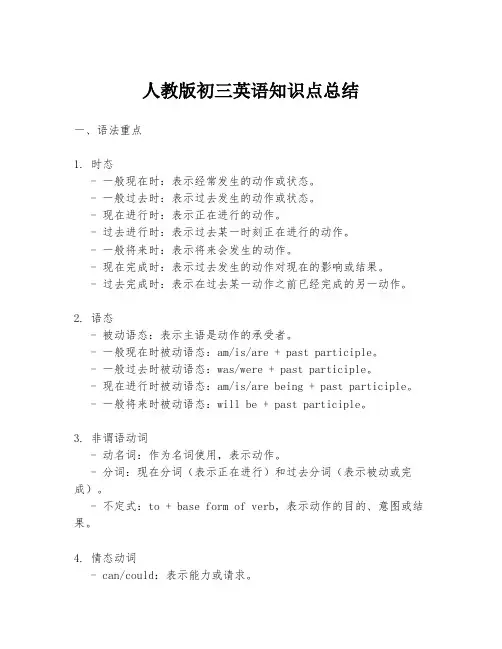
人教版初三英语知识点总结一、语法重点1. 时态- 一般现在时:表示经常发生的动作或状态。
- 一般过去时:表示过去发生的动作或状态。
- 现在进行时:表示正在进行的动作。
- 过去进行时:表示过去某一时刻正在进行的动作。
- 一般将来时:表示将来会发生的动作。
- 现在完成时:表示过去发生的动作对现在的影响或结果。
- 过去完成时:表示在过去某一动作之前已经完成的另一动作。
2. 语态- 被动语态:表示主语是动作的承受者。
- 一般现在时被动语态:am/is/are + past participle。
- 一般过去时被动语态:was/were + past participle。
- 现在进行时被动语态:am/is/are being + past participle。
- 一般将来时被动语态:will be + past participle。
3. 非谓语动词- 动名词:作为名词使用,表示动作。
- 分词:现在分词(表示正在进行)和过去分词(表示被动或完成)。
- 不定式:to + base form of verb,表示动作的目的、意图或结果。
4. 情态动词- can/could:表示能力或请求。
- may/might:表示可能性。
- must:表示必须或强烈义务。
- should/ought to:表示建议或应当。
5. 句子结构- 简单句:一个主语和一个谓语。
- 并列句:使用并列连词连接两个或多个简单句。
- 复合句:包含一个主句和至少一个从句。
- 定语从句:修饰名词或代词的从句。
- 状语从句:表示时间、地点、原因、条件、结果等。
二、词汇与短语1. 常见词汇- 描述人物特征的形容词:kind, honest, creative, etc.- 描述日常活动的动词短语:clean up, take out, turn off, etc.- 描述情感和情绪的名词:happiness, sadness, anger, etc. - 描述天气的词汇:sunny, rainy, windy, etc.2. 短语搭配- 动词短语搭配:finish doing, stop to do, remember to do, etc.- 形容词与介词的搭配:afraid of, interested in, good at, etc.- 常用口语表达:What's up?, How about…?, It's up to you, etc.三、阅读理解技巧1. 快速阅读(Skimming)- 快速浏览文章,抓住主旨大意。
人教版新目标初三英语九年级第一单元单词语法知识点总结
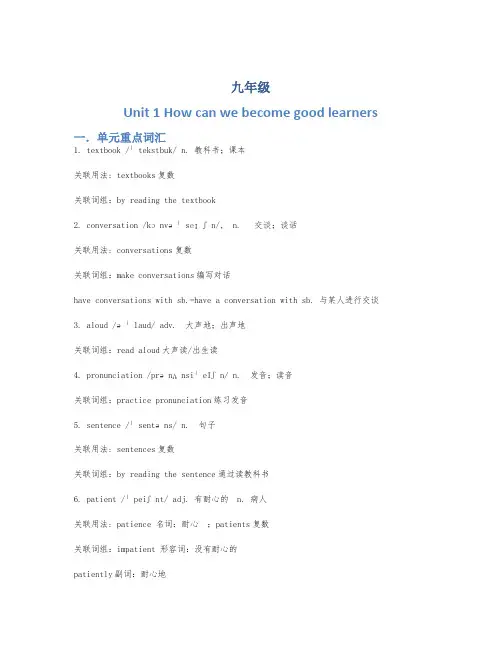
九年级Unit 1 How can we become good learners一.单元重点词汇1.textbook /ˈtekstbuk/ n. 教科书;课本关联用法: textbooks复数关联词组:by reading the textbook2.conversation /kɔnvəˈs eɪʃn/, n. 交谈;谈话关联用法: conversations复数关联词组:make conversations编写对话have conversations with sb.=have a conversation with sb. 与某人进行交谈3.aloud /əˈlaud/ adv. 大声地;出声地关联词组:read aloud大声读/出生读4.pronunciation /prənʌnsiˈeIʃn/ n. 发音;读音关联词组:practice pronunciation练习发音5.sentence /ˈsentəns/ n. 句子关联用法: sentences复数关联词组:by reading the sentence通过读教科书6.patient /ˈpeiʃnt/ adj. 有耐心的 n. 病人关联用法: patience 名词:耐心;patients复数关联词组:impatient 形容词:没有耐心的patiently副词:耐心地be patient with sb.对某人有耐心be patient of sth.对某事能容忍have (no) patience with…对…(没)有耐心lose patience with 对…失去耐心out of patience 没有耐心7.expression /ikˈspreʃn/ n. 表达(方式);表示关联用法:expressions复数关联词组:facial expressions 面部表情8.discover /dIˈskʌvə (r)/ v. 发现;发觉关联用法:discovery 名词:发现9.secret /ˈsi:krət/ n. 秘密;adj. 秘密的;保密的关联用法:secrets复数关联词组:in secret秘密地;keep a secret保密;a secret plan秘密的计划10.look up (在词典,参考书中或通过电脑)查阅;抬头看11.fall in love with 爱上;与⋯⋯相爱12.grammar /ˈgræmə (r)/ n. 语法关联词组:in grammar在语法方面13.repeat /riˈpi:t/ v. 重复;重做关联用法:secrets复数关联词组:repetition名词:重复14.note /nəut/ n. 笔记;记录 v.注意;指出关联用法:notes复数关联词组:please note 清注意;take notes记笔记15.pal /pæl/ n.朋友;伙伴关联词组:penpal笔友16.physics /ˈfiziks/ n. 物理;物理学关联单词:adj. 物理的;身体的;物质的;根据自然规律的,符合自然法则的关联词组:Space Physics 空间物理学物理空间空间物理17.chemistry /ˈkemistri/ n. 化学关联词组:Organic Chemistry 有机化学18.memorize /ˈmeməˌraɪz/ v 记住;记忆关联单词:memory n.记忆关联用法:过去式 memorized过去分词 memorized现在分词 memorizing第三人称单数memorizes典型例句:Have you memorized your lines for the play yet?你记住剧本中的台词了吗?19.pattern /ˈpætn/, /ˈpætən/ n.模式;方式20.pronounce /prəˈnaʊns/ v. 发音关联用法:过去式 pronounced过去分词 pronounced现在分词pronouncing第三人称单数 pronounces关联词组:Pronounce correctly 发音正确正确发音典型例句:I can not pronounce correctly 我不能正确发音21.increase /Inˈkri:s/ v. 增加;增长关联用法:过去式 increased过去分词 increased现在分词 increasing复数 increases第三人称单数 increasesn. 增加;增多;增长关联词组:increase by 增加了;按…增长on the increase 正在增加,正在增长22.speed /spi:d/ n.速度 v.加速关联单词:speeding超速关联用法:过去式 sped或speeded过去分词 sped或speeded现在分词 speeding关联词组:speed up 加速加快速度使加速加快speed limit 速度限制时速限制限速最高车速23.partner /ˈpa:(r)tnə (r)/ n. 搭档;同伴24.born /bɔːn/ v.出生 adj.天生的关联词组:be born with 天生具有born yesterday 乳臭未干典型例句:Swift was born in 1667.斯威夫特生于1667年。
202X年英语知识点汇总人教新目标九年级
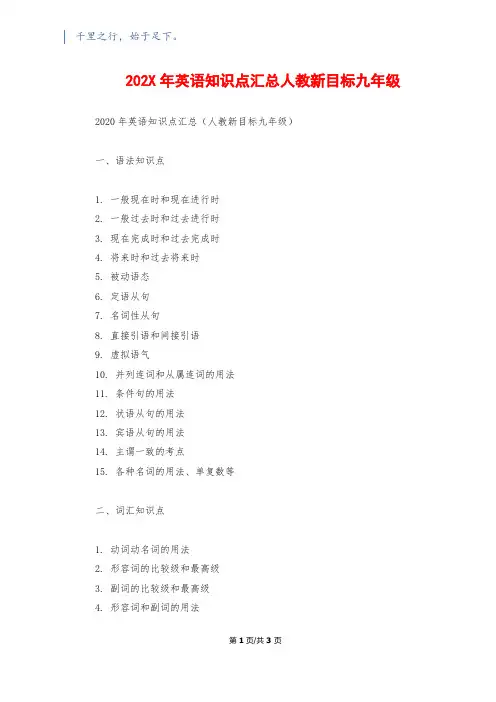
千里之行,始于足下。
202X年英语知识点汇总人教新目标九年级2020年英语知识点汇总(人教新目标九年级)一、语法知识点1. 一般现在时和现在进行时2. 一般过去时和过去进行时3. 现在完成时和过去完成时4. 将来时和过去将来时5. 被动语态6. 定语从句7. 名词性从句8. 直接引语和间接引语9. 虚拟语气10. 并列连词和从属连词的用法11. 条件句的用法12. 状语从句的用法13. 宾语从句的用法14. 主谓一致的考点15. 各种名词的用法、单复数等二、词汇知识点1. 动词动名词的用法2. 形容词的比较级和最高级3. 副词的比较级和最高级4. 形容词和副词的用法第1页/共3页锲而不舍,金石可镂。
5. 复合词的构成和词义6. 介词短语的用法7. 词义辨析8. 词组和固定搭配9. 常用短语和习惯用法10. 习惯用法的辨析11. 词形转换和派生词的用法12. 各种词类的用法13. 词汇的辨析和用法三、阅读理解1. 认字识词2. 词义猜测3. 阅读顺序4. 推理判断5. 阅读理解题型6. 文章主旨大意7. 文章结构8. 文章出处和作者意图9. 文章的背景和情节10. 文章的观点和态度四、写作技巧1. 书信的格式和写作方法2. 日记的写作技巧和模板3. 描写人物和事物的方法和技巧4. 叙事文的基本结构和写作方法5. 说明文的写作结构和方法千里之行,始于足下。
6. 议论文的写作方法和写作要点7. 描写环境的方法和技巧8. 写人的方法和技巧9. 文章的开头结尾的写作方法10. 给与建议和提出要求的写作方法五、口语和听力技巧1. 听力技巧和短文理解2. 表达观点和意见的口语表达3. 描述个人经历和事件的口语表达4. 提问和回答的技巧和表达方式5. 谈论过去和将来的口语表达6. 演讲和口头报告的技巧和写作方法7. 各种口语问答的技巧和表达方式8. 倾听和回答问题的技巧和方法9. 讨论和辩论的技巧和写作方法10. 口语表达的流利程度和准确性第3页/共3页。
初中英语人教新目标九年级全一册unit4知识点
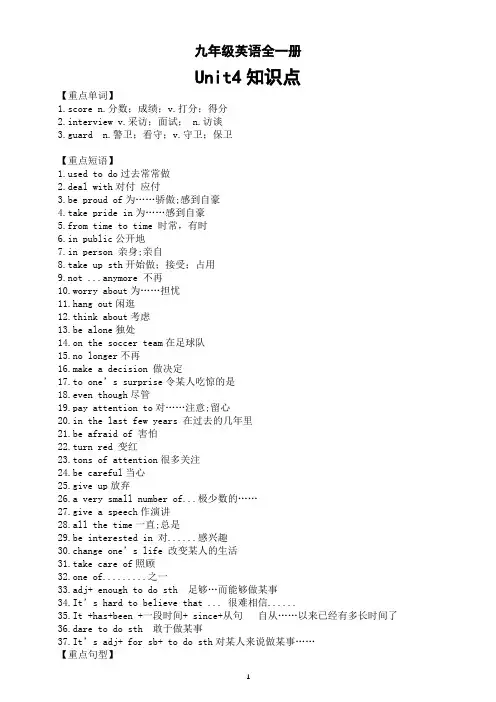
九年级英语全一册Unit4知识点【重点单词】1.score n.分数;成绩;v.打分;得分2.interview v.采访;面试; n.访谈3.guard n.警卫;看守;v.守卫;保卫【重点短语】ed to do过去常常做2.deal with对付应付3.be proud of为……骄傲;感到自豪4.take pride in为……感到自豪5.from time to time 时常,有时6.in public公开地7.in person 亲身;亲自8.take up sth开始做;接受;占用9.not ...anymore 不再10.worry about为……担忧11.hang out闲逛12.think about考虑13.be alone独处14.on the soccer team在足球队15.no longer不再16.make a decision 做决定17.to one’s surprise令某人吃惊的是18.even though尽管19.pay attention to对……注意;留心20.in the last few years 在过去的几年里21.be afraid of 害怕22.turn red 变红23.tons of attention很多关注24.be careful当心25.give up放弃26.a very small number of...极少数的……27.give a speech作演讲28.all the time一直;总是29.be interested in 对......感兴趣30.change one’s life 改变某人的生活31.take care of照顾32.one of.........之一33.adj+ enough to do sth 足够…而能够做某事34.It’s hard to believe that ... 很难相信......35.It +has+been +一段时间+ since+从句自从……以来已经有多长时间了36.dare to do sth 敢于做某事37.It’s adj+ for sb+ to do sth对某人来说做某事……【重点句型】1.I used to be afraid of the dark.我过去常常害怕黑暗。
初中英语人教新目标九年级全一册unit6知识点
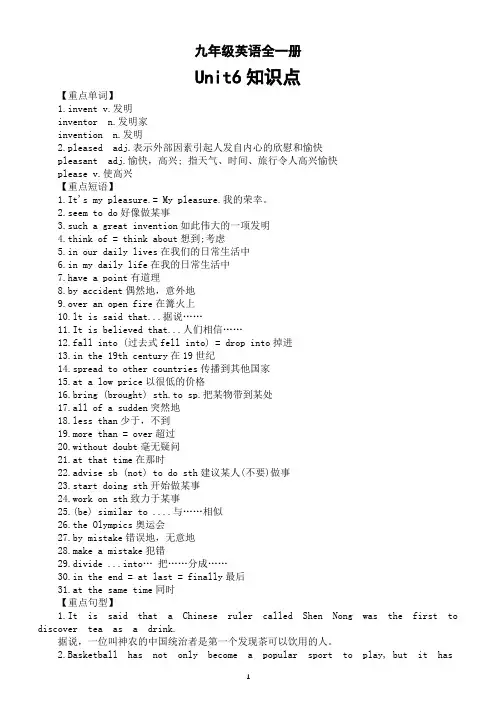
九年级英语全一册Unit6知识点【重点单词】1.invent v.发明inventor n.发明家invention n.发明2.pleased adj.表示外部因素引起人发自内心的欣慰和愉快pleasant adj.愉快,高兴; 指天气、时间、旅行令人高兴愉快please v.使高兴【重点短语】1.It's my pleasure.= My pleasure.我的荣幸。
2.seem to do好像做某事3.such a great invention如此伟大的一项发明4.think of = think about想到;考虑5.in our daily lives在我们的日常生活中6.in my daily life在我的日常生活中7.have a point有道理8.by accident偶然地,意外地9.over an open fire在篝火上10.lt is said that...据说……11.It is believed that...人们相信……12.fall into (过去式fell into) = drop into掉进13.in the 19th century在19世纪14.spread to other countries传播到其他国家15.at a low price以很低的价格16.bring (brought) sth.to sp.把某物带到某处17.all of a sudden突然地18.less than少于,不到19.more than = over超过20.without doubt毫无疑问21.at that time在那时22.advise sb (not) to do sth建议某人(不要)做事23.start doing sth开始做某事24.work on sth致力于某事25.(be) similar to ....与……相似26.the Olympics奥运会27.by mistake错误地,无意地28.make a mistake犯错29.divide ...into…把……分成……30.in the end = at last = finally最后31.at the same time同时【重点句型】1.It is said that a Chinese ruler called Shen Nong was the first to discover tea as a drink.据说,一位叫神农的中国统治者是第一个发现茶可以饮用的人。
人教版新目标九年级全一册英语语法知识点复习提纲

人教版新目标九年级全一册英语语法知识点复习提纲动词变名词1.v+ ment 结尾achieve —— achievement 成就advertise —— advertisement 广告agree —— agreement 同意amuse——amusement 娱乐commit —— commitment 承诺,奉献evelop —— development 发展disagree —— disagreement 不赞同equip 装备—— equipment 装备,器材govern 统治—— government 政府manage——management 经营,管理argue —— argument 争吵2.V+ ion 结尾3.attract —— attraction 吸引4.discuss —— discussion 讨论5.express ——-expression 词语;表达6.instruct —— instruction 用法说明invent—— invention 发明7.predict ——prediction 预言8.impress —— impression 印象9.suggest ——suggestion 建议,暗示10.educate —— education 教育11.graduate —— graduation 毕业12.operate —— operation 操作,动手术13.illustrate —— illustration 阐明,举例说明14.pollute —— pollution 污染15.introduce ——introduction 介绍16.organize ——organization组织17.imagine —— imagination 想象力18.inspire——inspiration 灵感,鼓舞人心的事19.invite —— invitation 邀请20.compete —— competition 竞争,比赛21.pronounce ——pronunciation发音22.admit —— admission 承认23.permit —— permission 允许24.conclude —— conclusion 结论25.decide —— decision 决定26.describe —— description描写,描绘27.resolve —— resolution 决心28.solve ——solution 解决方法3.V+ ance 结尾\1.allow —— allowance 允许2.appear —— appearance 外貌,出现3.perform —— performance 演出4.exist —— existence 存在5.V+ ing 结尾1.end —— ending 结尾,结局2.train ——training训练3.mean —— meaning 意义4.say—— saying 谚语5.remind —— reminding提醒6. bathe ——bathing沐浴6.词尾加-er或-or后变成表示“某一类人”的名词work——worker 工人7.teach——teacher老师8.sing——singer 歌手9.jump——jumper跳高运动员10.play——player表演者、运动员11.learn——learner 学习者12.visit——visitor访问者13.invent——inventor发明家7.V+ 其他8.beg——beggar 乞丐9.sit——seat 座位10.believe —— belief 信仰11.behave —— behavior 行为12.know—— knowledge 知识13.fly—— flight 飞行14.mix —— mixture 混合物15.press —— pressure 压力16.serve —— service 服务17.succeed ——success 成功18.pursue —— pursuit 追求,从事19.propose —— proposal 建议20.withdraw ——withdrawal 取钱;收回;撤退21.survive —— survival--survivor 幸存者22.arrive —— arrival到达23.analyze —— analysis 分析 2形容词变名词 1.词尾ent改为ency或ence24.efficient有效率的——efficiency 效率patient——patience/impatience 耐性/无耐心dependent——dependence依赖性independent——independence 独立性urgent——urgency 紧急25.2.ble结尾,ble改为bility26.possible—possibility 可能27.responsible—responsibility 责任;职责3.其他accurate—accuracy 准确性28.prosperous——prosperity 繁荣29.true——truth 真相30.wide——width 宽度31.long——length 长度32.high——height 高度 3名词/动词变形容词1.名词+y33.guilt 罪恶——guilty 内疚的34.health——healthy 健康的35.luck——lucky 幸运的36.cloud——cloudy 多云的37.wind—windy 多风的38.rain——rainy 多雨的39.snow——snowy 多雪的40.tourist —— touristy 游客多的er结尾,改er为ry hunger——hungry 饥饿的anger —— angry 生气的fog—— foggy 有雾的sun—— sunny 阳关灿烂的fur—— furry 毛皮的shine——shiny 发亮的taste —— tasty 美味的2.名词/动词+ ed以辅音+辅音结尾的单词,直接加edtalent —— talented 有天赋的offend ——offended 生气的crowd ——crowded 拥挤的以元音字母e结尾的单词直接加dbalance —— balanced 平衡的organize——organized 有组织的pollute ——polluted 被污染的please ——pleased 高兴的元音加辅音结尾的单词,词尾辅音双写再加edspot —— spotted 有斑点的3.名词+ ful/lesscare —— careful/ careless 小心的/ 粗心的help—— helpful / helpless 有帮助的/ 无助的use—— useful/ useless有用的/ 无用的meaning —— meaningful / meaningless有意义的/无意义的colour—— colourful /colourless多彩的/无色的pain 疼痛——painful /painless痛苦的/ 不痛的thank—— thankful / thankless 充满感激的/ 不知感恩的 peace 和平—— peaceful 和平的play游戏—— playful 爱玩耍的home —— homeless 无家可归的4.名词/动词+ able5.change —changeable 易变的6.adjust——adjustable 可调整的knowledge——knowledgeable 知识渊博的comfort—comfortable舒适的7.suit ——suitable 合适的动词以辅音加y结尾把y变i 加able ,deny—— deniable 可否认的rely—— reliable 可靠的4.名词+ ouscourage——courageous 勇敢的danger—— dangerous 危险的以y结尾,改y为i再加ousmystery 神秘—— mysterious 神秘的5.ce 变tconfidence—— confident 自信的difference——different 不同的6.dependence —— dependent 依赖他人的independence—— independent 独立的7.词尾加 aladdition—— additional 附加的,额外的music—— musical 音乐的person——personal (私人的)nation—— national 国家的education——educational有教育意义的tradition—— traditional 传统的origin起源——original 新颖的;独创的以元音字母e 结尾的单词,去掉词尾元音加al nature——natural 自然的globe—— global 全球的特例:class—— classical 经典的medicine 药——medical 医学的grammar—— grammatical 语法的8.名词+ lyfriend—— friendly 友好的live——lively 活跃的,有生气的love——lovely 可爱的week——weekly 每周的man——manly 男子气概的;强壮的9.词尾+ en10.wood—— wooden 木制的11.wool—— woolen 羊毛的10.表示方位的词11.East——eastern12.West——western13.outh——southern14.North——northern15.11.四大洲Asia 亚洲—— AsianAfrica 非洲——AfricanEurope欧洲—— EuropeanAmerica 美洲——American12.其他13.energy精力——energetic 精力充沛的strategy——strategic 战略的scientist——scientific 科学的fool 傻子——foolish 愚蠢的love——loving 慈爱的pleasure——pleasant令人愉快的/ pleased高兴的pride——proud 自豪的 4形容词变动词1.词尾加izemodern——modernize 使...现代化social——socialize 使...社会化2.词尾加enfast——fasten 使固定;集中于short—— shorten 缩短wide——widen 放宽less——lessen 使...减少特例(有变形):long——lengthen 使延长strong ——strengthen 加强;巩固3.词前加enlarge ——enlarge 扩大;放大 5形容词变副词1.形容词+ ly bad——badly 坏地bright——brightly 明亮地casual——casually 随意地cl ear——clearly 清楚地complete——completely 完全correct——correctly 正确地final——finally 最后fortunate——fortunately幸运地general——generally 一般来讲loud——loudly 大声地particular ——particularly特别地polite——politely 礼貌地proper ——properly适当地main——mainly 主要地most ——mostly 多半,大多数normal——normally 正常地quick——quickly 迅速地quiet——quietly 轻轻地,安静地real——really 真正地recent ——recently 最近;近来sad——sadly 悲哀地slow——slowly 缓慢地special——specially 专门,特殊地specific——specifically 特定地,明确地strong——strongly 坚决地,强烈地sudden——suddenly突然usual——usually 通常2.以le 结尾的,去e + yfortable——comfortably 舒服地gentle——gently 温柔地possible——possibly 可能地simple——simply 仅仅;只;简单地terrible——terribly 非常;极度地4.辅音字母+ y 变y为 ily5.easy——easily 容易地6.heavy——heavily 沉重地7.happy——happily 快乐地4.特殊good——well好地true——truly 真实地第11页共11页。
人教版新目标初中英语九年级全一册 知识点总结2单元
九年级Unit2I think that mooncakes are delicious!1.单元重点词汇1.mooncake/'mu:nkeɪk/n.月饼关联用法:mooncakes复数典型例句:What kind of mooncake do you like?你喜欢什么种类的月饼?ntern/'læntə(r)n/n.灯笼3.stranger/'streindʒə(r)/n.陌生人关联用法:strangers复数关联词组:strange adj.奇怪的;陌生的;外行的典型例句:‘Where’s the station?’‘Sorry,I’m a stranger here myself.’“车站在哪里?”“对不起,我也是外地人。
”4.relative/'relətiv/n.亲属;亲戚关联用法:relatives复数关联词组:relative adj.相对的;有关系的;成比例的5.put on增加(体重);发胖关联用法:put on:穿上;上演;增加;假装;使…上场关联词组:put away储存(钱);储存…备用;储蓄put back拨回;向后移put down写下;记下;镇压put forward提出(意见、建议)put in打断;插嘴put off延期;推迟典型例句:She put on her coat and went out.她穿上外套,出去了。
Inactive people often put on weight later in life.不好动的人常常会在今后的生活中发胖。
6.pound/paund/n.磅(重量单位);英镑7.folk/fəul k/adj.民间的;民俗的8.goddess/'gɔdes/n.女神9.whoever/huːˈevə/pron.无论谁;不管什么人关联用法:whoever可以写成no matter who典型例句:I’ll take whoever wants to go.谁想去我就带谁去。
人教版新目标英语九年级全册单元知识点及配套练习
人教版新目标英语九年级全册单元知识点及配套练习九年级英语单元知识Unit 12、动词现在分词和不定式可作主语,表单数3、介词后面的动词形式(~ing);4、What about+~ing;How about+~ing;5、too+形(副)+to(不定式);6、find+宾语+宾语补足语;7、not…at all一点也不;8、get+形容词;11、instead/instead of;12、listen to13、ask(sb.)for(sth.);14、for example;15、have fun(doing sth.)16、end up(with…)17、spoken English;English—speaking people(countries)18、make mistakes 19.talk to(with) sb.20、why don’t you(we,they )+动词原形?=why not+动词原形?21、laugh at22、first of all23、to begin with.24、later on25、be afraid of sth.(doing)be afraid to do sth.be afraid that从句26、in class/out of class /after class27、take notes30、have trouble doing sth.31、look up32、make up a conversation.33、around the world.34、deal with35、stay(keep)+形容词36、go by37、decide(not)to do sth.40、complain about sth.41、compare sth to sth.(把…比作…);compare sth with sth.(把…与…进行比较)42、43、break off45、study for a test50、find sb./sth.+宾语补足语;find it +宾语补足语+(for sb.)to do sth.51、try one's best (to do sth.)52、with the help of sb=with one's help53、much tootoo muchUnit 21、过去常做某事:主语used to(不定式)be used to(介词)be used to(不定式)be used for sth.(doing)2、not…any more→no more;not…any longer→no longer5、复合词:a fifteen-year-old boy6、对某人而言做某事是…的:It's(形容词)for sb. to do sth.7、be able to do sth.8、give up(+ ~ing)9、afford sth.(to do sth.)10、be interested in sth.(doing.sth.)11、in front of…in the front of…12、be terrified ofbe afraid of13、go to bed(sleep)14、on the soccer team15、worry about sb.(sth.)be worried about…worry that从句16、all the time17、take a bus to(某地) = go to(某地)by bus 20、spend+time(money) on sth/(in)doing sth.)It takes(took)sb.+时间+to do sth.物cost(某人)+钱人 pay 钱 for 物。
完整版人教版新目标九年级英语重点知识点
人教九年英要点知点Unit 1一、知点1.check in : 在旅的登入住。
check out: 在旅走开。
2.by: ①通⋯ ..方式(门路)。
例: I learn English by listening to tapes.②在⋯ ..旁。
例: by the window/the door③乘坐交通工具例: by bus/car ④在⋯⋯以前,到⋯⋯止。
例: by October 在 10 月前⑤被与what的区:how what 平常方式或程度提,意思有:怎么平常作的出者或接受者提,意思如何,平常用来做状、表。
什么,平常做,主。
①How is your summer holiday?②H ow did you travel around the world?③W hat do you learn at school?I learn English, math and many other subjects.①What⋯ think of⋯?How⋯ like⋯?②What⋯do with How⋯ deal with ⋯?⋯?③What⋯ like about⋯ ? How ⋯ like⋯?④What’ s the weather like today? How’ s the weather today?⑤What to do? How to do it?e.g. What do you think of this book?=How do you like this book?I don’ t know what I should do with the matter.=I don’ t know how I should deal with it. What do you like about China?=How do you like China?I don’ t know what to do next step?=I don’ t know how to do it next step?㊣ What good / bad weather it is today! (weather 不可以数名,其前不可以加 a )㊣What a fine / bad day it is today!(day 可数名,其前要加 a )4. aloud, loud与loudly的用法:三个都与"大声 "或 "响亮 "有关。
人教版新目标英语九年级Unit 7重点短语和知识点梳理
人教版新目标英语九年级Unit 7重点短语和知识点梳理【重点短语】1.get his driver’s license 取得驾驶执照2.no way没门,不行3.sixteen-year-olds 十六岁的人sixteen-year-old 十六岁的4. be worried about=worry about 担心、担忧5. have part-time jobs 做兼职工作6. get one’s ears pierced 打耳洞7. get / have / make sth. done 使某物被做……8. stop doing sth 停止做某事9. stop to do sth. 停下来去做某事10. spend time with sb. 花时间和某人在一起11.take photos, take a photo 照相e a flash 使用闪光灯13.all night 整夜14.stay by my side 呆在我身边15.make sure = be sure 确保,确定16.keep sb. (away) from sth使某人远离某物17. hurt oneself 伤害某人自己18. give sb. a hug = hug sb. 拥抱某人19.lift sb.up 举起某人20. cough badly 剧烈地咳嗽21. talk back 回嘴22. an adult 一个成人23. think back to 回想起24. regret doing sth. 后悔做了某事25. make one’s own decision 做某人自己的觉得26.too + adj.+ to do sth. 太…而不能做某事27.learn…from…从…...学到…...28.agree with sb 同意某人的观点29.disagree with sb. 不同意某人的观点30.move out 搬出去【重点句型】1.I don’t think twelve-year-olds should be allowed to get their ears pierced.我认为不应该允许12岁的孩子穿耳孔。
- 1、下载文档前请自行甄别文档内容的完整性,平台不提供额外的编辑、内容补充、找答案等附加服务。
- 2、"仅部分预览"的文档,不可在线预览部分如存在完整性等问题,可反馈申请退款(可完整预览的文档不适用该条件!)。
- 3、如文档侵犯您的权益,请联系客服反馈,我们会尽快为您处理(人工客服工作时间:9:00-18:30)。
8. get + 宾语 +宾补(形容词 过去分词 动词不定式) 使某种情况发生 例: Get the shoes clean. 把鞋擦干净; Get Mr. Green to come. 让格林先生进来 I want to get my bike repaired. 我想去修自行车 You can’ t get him waiting. 你不能让他老等着
5. voice 指人的嗓音 也指鸟鸣。 sound 指人可以听到的各种声音。 noise 指噪音、吵闹声
6. find + 宾语 + 宾补(名词 形容词 介词短语 分词等) 例: I find him friendly.
I found him working in the garden. We found him in bed. He found the window closed. We found her honest.
What… think of …? How… like …? ②
What… do with …?
How… deal with …? ③
What… like about ④
… ? How … like …?
What’ s the weather like today? How ⑤
’ s the weather today?
人教九年级英语重点知识点
Unit 1
一、知识点 1.check in : 在旅馆的登记入住。 check out: 在旅馆结账离开。
2.by: ①通过… ..方式(途径) 。例: I learn English by listening to tapes.
②在… ..旁边。例: by the window/the door
What to do? How to do it?
e.g. What do you think of this book?=How do you like this book? I don ’ t know what I should do with the matter.=I don
’ t know how I should deal with it.
③乘坐交通工具 例: by bus/car
④在……之前,到……为止。例: by October 在 10 月前
⑤被
例: English is spoken by many people.
3.how 与 what 的区别: how 通常对方式或程度提问,意思有:怎么样 what 通常对动作的发出者或接受者提问,意思为 ①How is your summer holiday?
㊣ What a fine / bad day it is today!
(day 为可数名词,其前要加 a )
4. aloud, loud 与 loudly 的用法:三个词都与 "大声 "或 " 响亮 "有关。 ① aloud 是副词 ,重点在出声能让人听见 ,但声音不一定很大 ,
常用在读书或说话上。通常放在动词之后。 aloud 没有比较级形式。 如: He read the story aloud to his son. 他朗读那篇故事给他儿子听。 ②loud 可作形容词或副词。用作副词时 ,常与 speak, talk, laugh 等动词连用 ,多用于比较级 ,须 放在动词之后。如: She told us to speak a little louder. 她让我们说大声一点。 ③loudly 是副词 ,与 loud 同义 ,有时两者可替换使用 ,但往往 含有令人讨厌或打扰别人的意思 ,可位于动词之前或之后。如 : He does not talk loudly or laugh loudly in public. 他不当众大声谈笑。
10. practice , fun 做名词为不可数名词
11. add 补充说 又说12Βιβλιοθήκη join 加入某团体 并成为其中一员
attend 出席参加会议或讲座 join in 与 take part in 指参加到某项活动中去。
13.all 、 both、 always 以及 every 复合词与 not 连用构成部分否定。 其完全否定为: all---none, both---neither, everything---nothing, everybody---nobody.
如何,通常用来做状语、表语。 什么,通常做宾语,主语。
It ’ s OK.(how 表示程度 做表语 ) ②How did you travel around the world?
I travel by air. ③What do you learn at school?
I learn English, math and many other subjects. ①
What do you like about China?=How do you like China?
I don ’ t know what to do next step?=I don
’ t know how to do it next step?
㊣ What good / bad weather it is today! (weather 为不可数名词,其前不能加 a )
9. 动词不定式做定语 ①与所修饰的名词构成主谓关系 The next train to arrive was from New York. He is always the first to come. ②与所修饰的名词构成动宾关系 I have nothing to say. I need a pen to write with. I need some paper to write on. I don ’ t have a room to live in.
